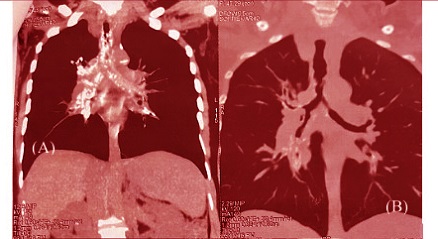Sri Lankan Case Study Shows That COVID-19 Can Cause Tracheobronchial Amyloidosis
Nikhil Prasad Fact checked by:Thailand Medical News team Dec 04, 2024 1 year, 2 weeks, 13 hours, 38 minutes ago
Medical News: Understanding Tracheobronchial Amyloidosis
A rare and complex disease, tracheobronchial amyloidosis (TBA), has emerged in a medical case study as potentially linked to post-COVID conditions. Researchers from the University Medical Unit at Colombo South Teaching Hospital, the Respiratory Unit at National Hospital of Sri Lanka, and the Faculty of Medical Sciences at the University of Sri Jayewardenepura collaborated on this fascinating case report. Their findings shed light on the potential role of severe COVID-19 in triggering or exacerbating this uncommon condition, where amyloid proteins are deposited in the trachea and bronchi.
 Sri Lankan Case Study Shows That COVID-19 Can Cause Tracheobronchial Amyloidosis
Sri Lankan Case Study Shows That COVID-19 Can Cause Tracheobronchial Amyloidosis
Tracheobronchial amyloidosis is an airway condition in which amyloid deposits build up in the airway mucosa. Clinical presentation varies from chronic cough to shortness of breath, hemoptysis and even stridor. The final diagnosis is often made during bronchoscopy, which includes bronchial biopsies revealing positive Congo red staining. The treatment of tracheobronchial amyloidosis remains a challenge. The treatment most often reported in the literature is mechanical debulking. Improving airway patency can be performed using rigid or flexible bronchoscopy, in addition to cautery, laser or forceps. The prognosis remains more favourable than for systemic amyloidosis. Recently, the use of radiation therapy of the airway has shown encouraging results in the treatment of the disease. It is possible that tracheobronchial amyloidosis is more prevalent than previously believed because it is often underdiagnosed.
This
Medical News report delves into the case of a 68-year-old woman who developed persistent respiratory symptoms after recovering from COVID-19. Her condition puzzled doctors until diagnostic tests revealed tracheobronchial amyloidosis, a disease known for narrowing airways and causing chronic respiratory distress. The case underscores the importance of considering rare causes for lingering symptoms in post-COVID patients.
The Case That Caught Attention
The patient, previously diagnosed with type-2 diabetes, ischemic heart disease, and cirrhosis, faced a chronic, non-productive cough that refused to subside even months after her COVID-19 recovery. Initial suspicions leaned towards common post-viral sequelae. However, persistent wheezing and resistance to bronchodilator treatments signaled something more unusual. Detailed investigations, including high-resolution CT scans and bronchoscopy, revealed calcifications in her airways and nodular lesions indicative of tracheobronchial amyloidosis.
Histological examination confirmed the presence of amyloid deposits. The condition, while rare, has gained attention for its potential links to inflammatory responses, such as those triggered by severe COVID-19.
COVID-19 and Amyloidosis
Amyloidosis results from the abnormal deposition of proteins, often tied to chronic inflammation. The relationship between COVID-19 and amyloidosis is a growing field of interest. The SARS-CoV
-2 virus is known to provoke intense immune and inflammatory responses. Elevated levels of serum amyloid A (SAA) protein during such events might lead to the development or worsening of tracheobronchial amyloidosis.
In this case, the temporal association suggests that the inflammation caused by COVID-19 could have played a role. While systemic amyloidosis affects multiple organs, tracheobronchial amyloidosis is usually localized, complicating its diagnosis due to the non-specific nature of symptoms like cough and breathing difficulties.
Challenges in Diagnosis and Management
Diagnosing tracheobronchial amyloidosis is challenging. The disease often mimics other respiratory conditions, and traditional imaging methods may not detect airway abnormalities. For this patient, advanced imaging and biopsy proved essential. Bronchoscopy revealed the characteristic lesions, while histological analysis confirmed the diagnosis through Congo red staining.
Management strategies for tracheobronchial amyloidosis are equally complex. While systemic treatments like chemotherapy are options for certain amyloidosis types, localized TBA often requires targeted interventions. The patient received symptomatic treatments but succumbed to an unrelated cardiac event before more advanced therapies could be initiated.
Implications for Future Research and Clinical Practice
The case highlights the need for heightened awareness of rare post-COVID conditions among healthcare providers. It also emphasizes the importance of comprehensive diagnostic approaches for patients with unresolved respiratory symptoms. The interplay between COVID-19 and amyloidosis demands further study to unravel the underlying mechanisms and improve patient outcomes.
Conclusions
This case study presents a sobering yet fascinating look at how COVID-19 may influence rare diseases like tracheobronchial amyloidosis. It underlines the potential for COVID-19 to act as a trigger for inflammatory or immune-mediated conditions. Medical professionals must remain vigilant in investigating uncommon causes of persistent symptoms in post-COVID patients. The integration of advanced imaging techniques, histological analyses, and multidisciplinary care is crucial in managing such cases. Furthermore, the potential link between elevated serum amyloid A protein levels during COVID-19 and amyloid deposits warrants more research to validate these findings. Understanding these interactions could pave the way for earlier interventions and better disease management strategies.
The study findings were published in the peer-reviewed journal: Respirology Case Reports.
https://onlinelibrary.wiley.com/doi/10.1002/rcr2.70073
For the latest COVID-19 News, keep on logging to Thailand
Medical News.
Read Also:
https://www.thailandmedical.news/news/breaking-news-researchers-find-that-covid-19-infections-and-even-covid-19-vaccines-can-induce-amyloidosis
https://www.thailandmedical.news/news/south-korean-physicians-warn-that-covid-19-infections-can-trigger-gastrointestinal-aa-amyloidosis
https://www.thailandmedical.news/news/breaking-university-of-oklahoma-study-indicates-that-sars-cov-2-might-cause-serum-amyloid-a-saa-amyloidosis-and-even-alzheimer-ultimately
